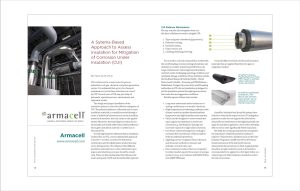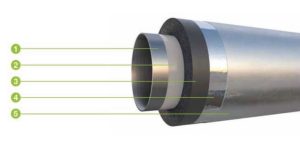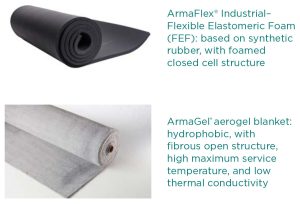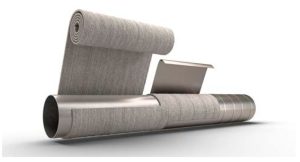Armacell- A System-Based Approach to Assess Insulation for Mitigation of Corrosion Under Insulation (CUI)
Armacell
www.armacell.com
CUI continues to be a major issue for process industries in oil, gas, chemical, and power-generation sectors. It is estimated that up to 10% of annual maintenance costs in these industries are caused by CUI1. Several cases of CUI may put safety of personnel, operation process, environment, and reputation at risk.
The design and proper installation of the insulation system is critical for effective mitigation of CUI. The potential influence of thermal and acoustic insulation materials is normally assessed through a series of individual laboratory tests on the insulation materials themselves, but very rarely on the applied system. Moreover, the tested physical values do not necessarily and readily reflect the potential influence that a given insulation material or system has on the risk of CUI.
To truly appreciate the influence that an insulation material has on CUI, a more sophisticated approach is needed—one that considers the full system construction and the likely failure modes that may occur during service. The influence that different insulation materials have on the water/water vapor ingress and retention processes should be considered. These are key mechanisms that influence the onset and spread of CUI and should be fully explored.
CUI Defense Mechanisms
We may consider that altogether there are five lines of defense at work to mitigate CUI:
1. Type and grade of steelwork (pipe/vessel),
2. Protective coating,
3. Insulation layers,
4. Vapor barrier, and
5. Cladding/Jacketing/Covering
For more than a decade, Armacell has worked with the world’s leading corrosion testing laboratories and institutes to conduct system-based CUI tests on its range of elastomeric and aerogel-based insulation materials under challenging operating conditions and simulated damage conditions. These institutes include the Southwest Research Institute (SwRI) – United States, InnCoa GmbH – Germany, and TNO/Endures – Netherlands. Designed by some of the world’s leading authorities on CUI, the test standards are designed to put the insulation systems through rigorous evaluation under the most aggressive conditions.
Notable aspects of these tests include:
- Long-term assessment under continuous or cycling conditions (3 to 6 months’ duration);
- High-temperature and sweating conditions, with climate control to simulate elevated ambient temperature and high-humidity environments;
- Failure modes designed to assess water/water vapor ingress and retention in worst-case scenarios (e.g., full thickness damage and increased exposure to high-saline solutions);
- Use of bare carbon steel pipes (no coating) to scrutinize the true behavior of the insulation without additional protection;
- Applying various recognized electrochemical and ultrasonic methods to measure and evaluate corrosion rates; and
- Peer-reviewed procedures that are recognized by subject matter experts from major oil and gas producers (e.g., in accordance with NACE TG516, now AMPP TM21442).
Armacell offers two kinds of industrial insulation materials that are applied directly to the pipe or equipment surface:
ArmaFlex Industrial and ArmaGel systems have both been tested with respect to their CUI mitigation properties under the test regimes described above. Armacell’s test results were in the highest possible category for insulation applied to a bare carbon steel pipe, with corrosion rates significantly below 50µm/year.
Recently, the oil and gas industry has recognized the importance of hybrid insulation systems to improve CUI protection. Initiatives such as the Joint Industry Programme 33 (JIP 33), led by the International Association of Oil and Gas Producers, demonstrate this awareness. In their supplementary standard, aerogel insulation (such as ArmaGel) is recommended to be applied as a first layer before secondary layers of other insulation material to reduce the risk of corrosion.
For more information on the range of CUI tests performed on Armacell insulation systems, and to understand what makes ArmaGel and ArmaFlex excellent choices for CUI mitigation, please refer to https://local.armacell.com/en/energy/services/
corrosion-under-insulation-cui.
Reference
1. NACE Impact Study, 2016, Annex D, page D-10.
ABOUT ARMACELL. A leading provider of engineered foams, Armacell develops innovative and safe thermal, acoustic, and mechanical solutions that create sustainable value for its customers. Armacell’s products significantly contribute to global energy efficiency, making a difference around the world every day. With 3,100 employees and 24 production plants in 16 countries, the company operates two main businesses: Advanced Insulation and Engineered Foams. Armacell focuses on insulation materials for technical equipment, high-performance foams for high-tech and lightweight applications, and next-generation aerogel blanket technology.




